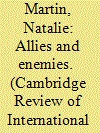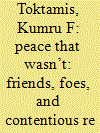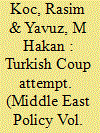|
|
|
Sort Order |
|
|
|
Items / Page
|
|
|
|
|
|
|
| Srl | Item |
| 1 |
ID:
183910


|
|
|
|
|
| Summary/Abstract |
This paper charts how the Gülen movement (GM)’s allegiance and effectiveness has changed over the past two decades. It examines how the GM has moved from being a fellow Islamist actor in Turkish politics to close ally during the first ten years of the AKP government with the joint aim of decreasing the Kemalist hold on the establishment. The paper then examines how the GM has been delegitimised by the AKP since it became more of a risk than an asset amidst disagreements over policy direction. It argues that the GM has transitioned from being a rival to an ally of the AKP in order to facilitate policy; going from a non-state actor pre-2002 to a quasi-state actor during its alliance. The alliance was a mutually beneficial ‘marriage of convenience’ which enabled both parties to consolidate power often through illiberal means. However, since 2013 the AKP-Gülen relationship has deteriorated markedly and the movement is now an enemy of the AKP and a victim of the same authoritarian drift it was previously complicit in.
|
|
|
|
|
|
|
|
|
|
|
|
|
|
|
|
| 2 |
ID:
188180


|
|
|
|
|
| Summary/Abstract |
Diasporas do not arise from fixed connections to objective circumstances such as dispersion or relation to a homeland, but instead constantly are negotiated and re-constituted. Ranging from internal gradual change to sudden exogenous change, the re-making of a diaspora can take diverse forms. Despite the prevalence of constructivist and processual approaches, however, research on diaspora identity change has been limited. This paper takes a comparative historical perspective to the post-2016 diasporization of the Gülen Movement (GM) and discusses how the GM responded differently to sudden exogenous shocks in 1997, 2007, and 2016. In both historical institutionalism and rational choice theories, the sudden exogenous shocks do the heavy lifting to explain change; however, it is rather the endogenous parameters that account for the variation in the GM’s responses to those shocks.
|
|
|
|
|
|
|
|
|
|
|
|
|
|
|
|
| 3 |
ID:
161143


|
|
|
|
|
| Summary/Abstract |
This essay explores the relationship between the collapse of negotiations between Turkey and the PKK and the rupture between the governing AKP and its former ally, the Cemaat or Gülen Movement. This schism transformed both the AKP regime and Kurdish politics. This article traces the shifting narratives of key actors in this process. It also identifies the multifaceted underpinnings of the political violence that erupted and disrupted the resolution/peace process. In the end, the peace/resolution process was a (re)entrenchment, or inadvertent re-positioning of violent means of suppression against Kurdish politics in Turkey, beyond the particular intentions, beliefs, ideas and attitudes of all parties.
|
|
|
|
|
|
|
|
|
|
|
|
|
|
|
|
| 4 |
ID:
149125


|
|
|
|
|
| Summary/Abstract |
When the Justice and Development Party (AKP) came to power in 2002, it encountered major resistance from state institutions, especially the secularist military, due to its Islamist roots and antisecular rhetoric. In an effort to counter the military and control state institutions, then-Prime Minister Recep Tayyip Erdoğan appointed followers of Fethullah Gülen to key government positions. This administrative support from the Gülen movement enabled the AKP to govern the country and closely monitor the military with the help of the police force. In order to consolidate his reputation as a moderately liberal Muslim leader, Erdoğan endorsed Turkey's joining the European Union, believing that membership in the EU would help grow the economy and build a democratic society.
|
|
|
|
|
|
|
|
|
|
|
|
|
|
|
|
| 5 |
ID:
159238


|
|
|
|
|
| Summary/Abstract |
Turkey has been undergoing a transition in governance over decades, most recently in the sociopolitical transformation from Kemalist laicism to Islamic-dominated politics. The shifts have been uneven, with government frequently overtaken by military control, and then returned to some form of democratic functioning, with associated changes in the laws reflecting greater or lesser tolerance for multi-party politics, public religious practice, and EU-inspired civic liberties. Throughout, the experience has engaged a tension between Western influences and Islamic norms as interpreted through processes of modernization and economic liberalization. The media’s role as a conveyor of cultural imaginaries and national identities has led it to play an important part in this trajectory. Yet, although its autonomy has varied depending on those in power—at times being a tool entirely controlled by government, at others operating with few fetters—the laws and regulations surrounding the media have varied much less, suggesting the legal structure defining Turkish media reflects in general terms the public’s view of its position and role in society. This is despite the fact that the media laws in Turkey have not been holistically forged, nor rigorously updated to accommodate technological change. What is suggested here is that the media’s status as a strategic circulator of ideas within social relations and as an ideological bellwether of public values, has been translated into the legal corpus, creating a uniquely Turkish interpretation of the media’s agency, and instrumentality, which we suggest is made comprehensible through Values and Status Negotiation Theory (VSN).
|
|
|
|
|
|
|
|
|
|
|
|
|
|
|
|
|
|
|
|
|